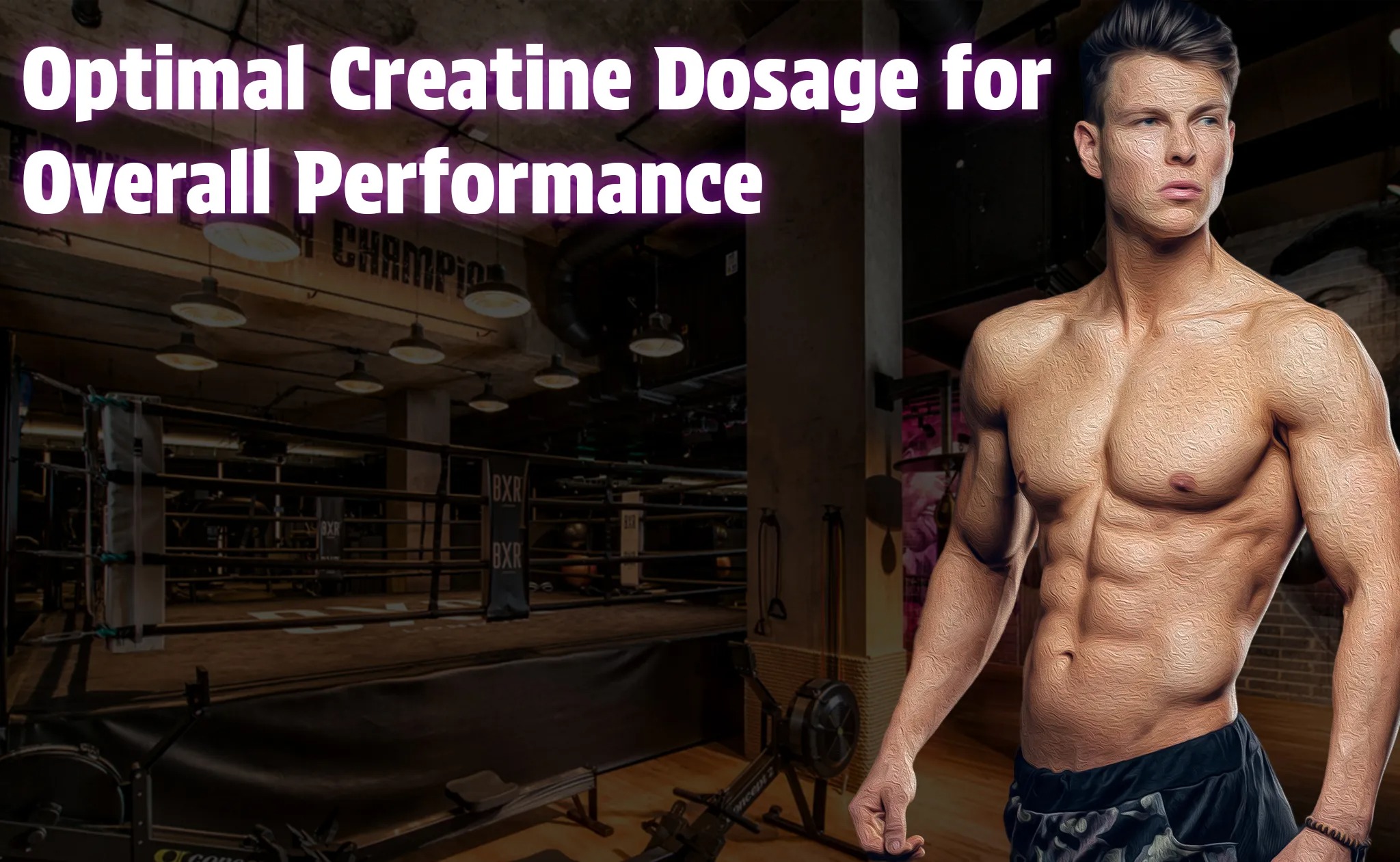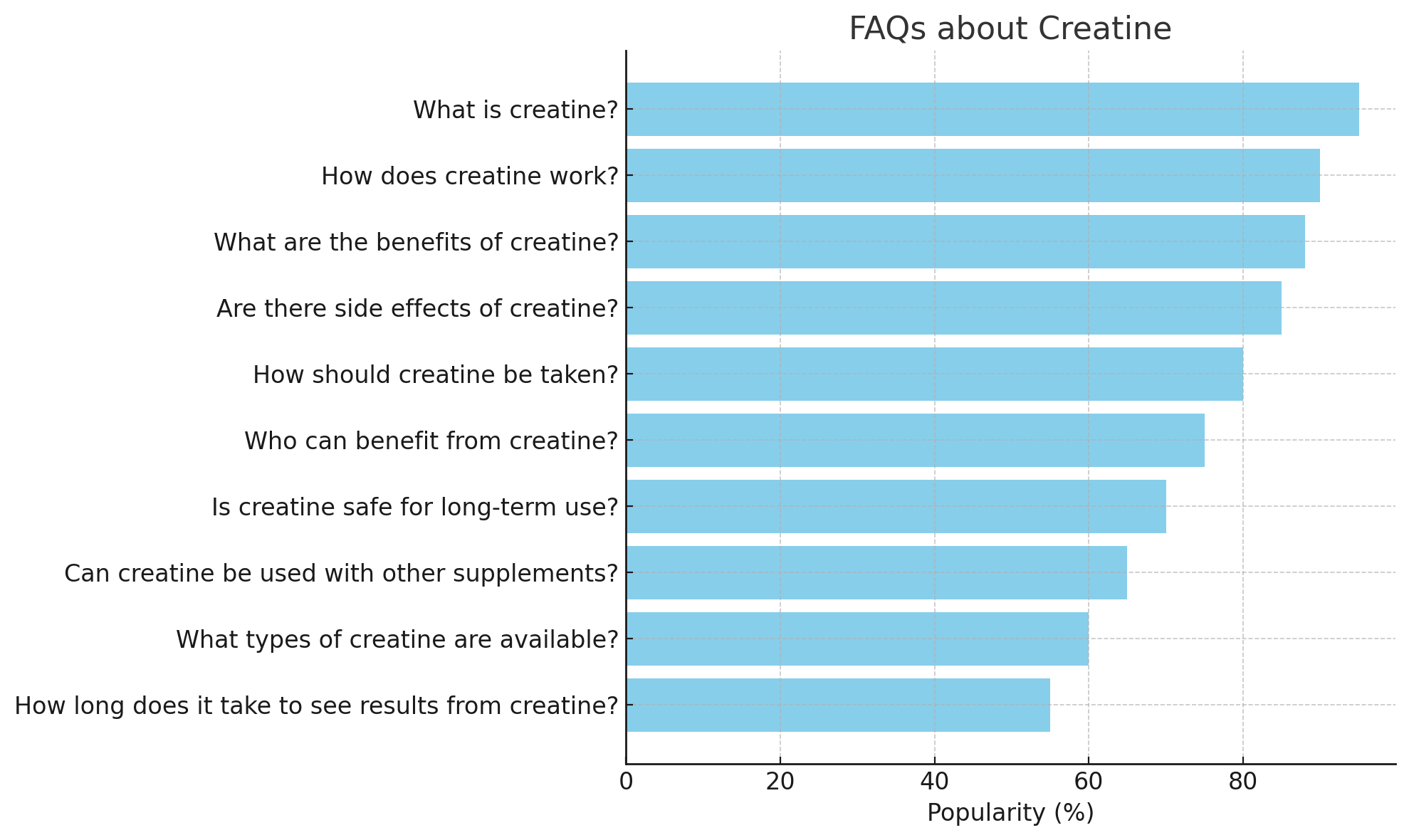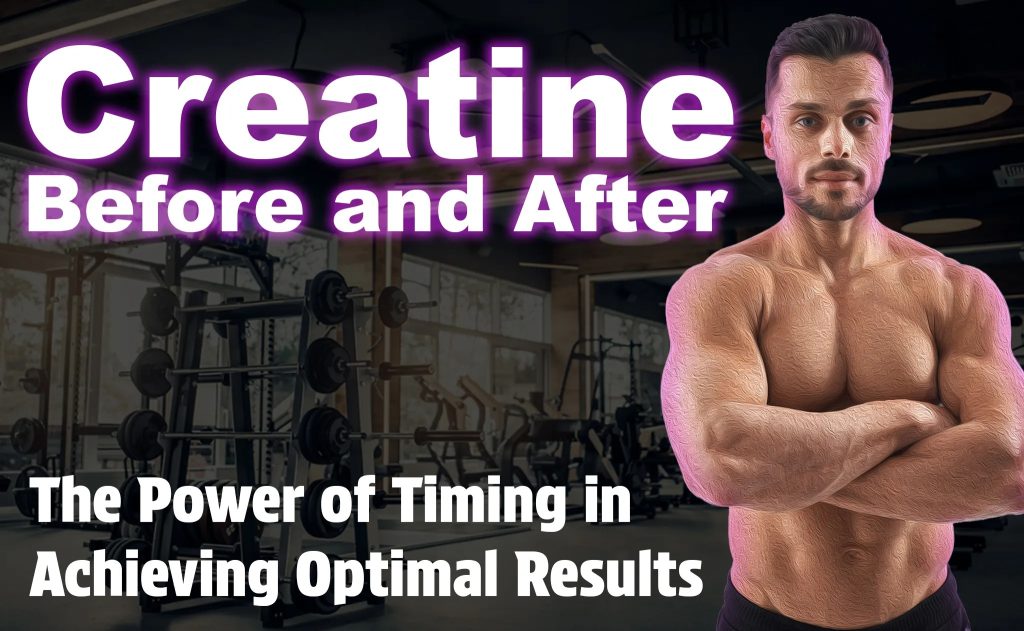When it comes to bodybuilding, timing is everything. Same goes to creatine, whether you take it as pre-workout or post-workout, there are different benefits you can have. Strategic creatine supplementation can be the game-changer you need to take your bodybuilding to the next level. Explore the power of timing and unlock your true potential with creatine before and after your workouts.
What is Creatine and How Does it Work?
Creatine is a naturally occurring compound in our bodies that plays a crucial role in energy production. It is found primarily in our muscles and is obtained through our diet, mainly from meat and fish. When we consume creatine, it gets converted into creatine phosphate, which is then stored in our muscles.
During intense physical activities, like weightlifting and sprinting, our muscles need a quick burst of energy. This is where creatine comes into play. Creatine phosphate donates its phosphate molecule to ADP (adenosine diphosphate), converting it back into ATP (adenosine triphosphate), which is the primary source of energy for our muscles. By replenishing ATP stores, creatine helps to sustain muscle contractions and power output during high-intensity exercises.
Additionally, creatine supplementation can lead to increased muscle mass and strength over time. This occurs because creatine not only boosts ATP production but also draws water into muscle cells, promoting an environment conducive to muscle growth. This process, known as cell volumization, can lead to a more substantial and fuller muscle appearance.
Moreover, creatine has been shown to enhance recovery by reducing muscle cell damage and inflammation following exhaustive exercise. This means athletes can train harder and recover faster, leading to better overall performance and gains. Studies have also suggested potential cognitive benefits, as creatine might support brain energy metabolism, potentially improving mental performance and reducing fatigue.
Creatine is considered one of the most well-researched and safe supplements available. Its benefits extend beyond just athletes and bodybuilders; even older adults and vegetarians can experience improvements in muscle function and overall health by incorporating creatine into their routine.
Creatine Before and After: Understanding Creatine Timing
In the world of fitness and bodybuilding, understanding the optimal timing for creatine supplementation is crucial. By strategically incorporating creatine into your routine, you can maximize its benefits and achieve better results.
The Significance of Timing in Creatine Supplementation
When it comes to creatine supplementation, timing plays a vital role in its effectiveness. Timing refers to the specific moment you choose to consume creatine in relation to your workouts. The idea is to strategically take creatine to optimize its absorption, utilization, and impact on your performance.
Should You Take Creatine Before or After Workouts?
One common question among fitness enthusiasts is whether to take creatine before or after workouts. Both timing options have their advantages and can offer specific benefits to enhance your training and performance.
Remember, the decision of when to take creatine ultimately depends on your personal goals and preferences. Some individuals may prefer the pre-workout boost, while others may prioritize the post-workout recovery benefits.
Creatine as a Pre-Workout Supplement
Taking creatine as a pre-workout supplement can provide a range of benefits that can elevate your workout performance.
Increasing ATP Levels and Energy Output
ATP serves as the primary source of energy for our muscles during exercise. By increasing the availability of ATP, creatine assists in providing the energy required for high-intensity movements and explosive exercises.
When we consume creatine, it gets converted into creatine phosphate, which can donate a phosphate molecule to ADP (adenosine diphosphate) to convert it back into ATP. This replenishment of ATP stores allows muscles to:
- Maintain energy production
- Delaying fatigue
- Sustaining muscular contractions during demanding workouts.
Boosting Strength and Power Output
By aiding in the production of ATP, creatine supports the contraction of muscles, making them capable of generating greater force. This can result in improved performance in activities such as weightlifting, sprinting, and other explosive movements.
- In addition, it has been linked to improved muscle cell hydration, which can promote cell volume and create an environment conducive to optimal muscular function.
- With increased strength and power output, you may be able to lift heavier weights, perform more repetitions, and push yourself harder during workouts, leading to greater gains in strength and muscle mass.
Maximize Muscle Recovery with Creatine Post-Workout
Muscle recovery and repair is a crucial aspect of any workout routine. When we engage in intense exercise, our muscles undergo micro-tears and oxidative stress. It is during the recovery phase that our muscles repair and adapt, leading to increased strength and growth. Creatine can play a significant role in this process, aiding in faster recovery and reducing the potential soreness associated with intense workouts.
Promoting Faster Recovery
During exercise, our muscles utilize creatine phosphate for energy production. By consuming creatine post-workout, we can replenish these stores, ensuring they are readily available for the next training session.
- Creatine supplementation has been shown to enhance glycogen synthesis, a process that replenishes the stored carbohydrates in our muscles. Adequate glycogen levels aid in faster recovery by providing the necessary fuel for energy production and cellular repair.
Reducing Post-Workout Soreness
Post-workout soreness, also known as delayed onset muscle soreness (DOMS), is a common occurrence after intense exercise. Creatine supplementation post-workout has been shown to reduce the severity and duration of this soreness.
- Creatine’s anti-inflammatory properties help minimize muscle damage caused by excess oxidative stress during exercise.
- By reducing inflammation, creatine can alleviate muscle soreness, allowing for a quicker recovery period. This can ultimately contribute to more consistent training sessions and better overall performance.
Should You Take Creatine on Rest Days?
When it comes to optimizing our workout routines, we often focus on what we do during our active training days. However, it’s essential to consider the role of rest days in our fitness regimen. Rest days provide your body with the necessary time to recover and adapt to the stress of exercise.
Understanding the Importance of Creatine on Rest Days for Maintaining Muscle Gains
Rest days are not idle days; they are an integral part of the training process. During workouts, we subject our muscles to stress and micro-tears, and it is during rest periods that they repair and grow stronger.
- Creatine can play a valuable role in this process, aiding in muscle retention and optimizing your gains.
How Creatine Aids in Muscle Retention during Rest Periods
One of the primary benefits of taking creatine on rest days is its ability to maintain muscle mass. hen we engage in intense physical activity, our muscle fibers are broken down, and protein synthesis is stimulated during rest periods to rebuild and reinforce these fibers.
- Creatine supplementation supports this process by enhancing protein synthesis, allowing for more efficient muscle recovery and repair.
- Additionally, creatine helps to maintain muscle hydration levels, which is crucial for promoting an anabolic (muscle-building) environment.
Enhancing Recovery and Reducing Muscle Breakdown
During rest days, our bodies are still engaged in the repair and recovery process.
- Creatine supplementation can aid in this process by enhancing the replenishment of ATP (adenosine triphosphate) stores in our muscles.
- By restoring energy levels, creatine contributes to faster recovery, allowing your muscles to bounce back more quickly and be ready for the next training session.
- Creatine has been shown to have anti-catabolic effects, which means it helps reduce muscle breakdown. This is particularly beneficial during rest periods when our bodies are more susceptible to muscle degradation. By inhibiting muscle breakdown, creatine can help protect and preserve the hard-earned muscle gains.
Dispelling Myths About Creatine Timing
In the world of fitness supplements, creatine is often touted as one of the most effective and widely-used options for aiding in muscle recovery and growth. However, when it comes to the timing of creatine supplementation, there is a lot of misinformation and confusion among gym-goers.
Addressing Common Myths Surrounding Creatine Usage on Rest Days
One of the most common myths surrounding creatine is that it should only be taken before or after a workout and not on rest days.
As mentioned above, this is simply not true. Rest days are an integral part of any workout routine. Proper supplementation during these periods can aid in recovery, enhance protein synthesis, and promote muscle growth.
Separating Fact from Fiction in Creatine Timing Debates
One myth surrounding creatine is that taking it before a workout is necessary and more effective for muscle gains.
Creatine is effective in aiding muscle growth and recovery whether taken before, during, or after a workout. What matters most is consistent and proper dosing. As long as you continue to supplement with creatine consistently, you will continue to reap its benefits.
Optimal Creatine Dosage for Overall Performance

Determining the optimal dosage for Creatine use can be confusing for many individuals.
Tailoring Creatine Dosage to Individual Bodybuilding Goals
When it comes to creatine dosage, a one-size-fits-all approach doesn’t exist. It’s important to consider your individual bodybuilding goals when determining the ideal amount of creatine to take.
- General recommended dosage is 3-5 grams per day, adjustments can be made based on your specific needs.
- For individuals seeking to increase muscle size and strength, Taking 5-10 grams of creatine per day can provide enhanced performance and muscle gains. It’s important to divide this dosage into smaller amounts and take them throughout the day to ensure optimal absorption and utilization by the muscles.
- If your primary goal is to maintain performance and aid in recovery, a lower dosage of creatine may be sufficient. Taking 2-3 grams per day can still provide benefits without the risk of overwhelming your system or causing excessive bloating.
Creatine Loading Phase
Another consideration when it comes to creatine dosage is the loading phase. This is a period in which a higher dosage is taken for a short period of time to quickly saturate the muscles with creatine.
- The loading phase involves taking 20g-25g of creatine per day for 5 to 7 days, then followed by a maintenance phase of 3g-5g per day.
- While the loading phase can help expedite the effects of creatine, it is not necessary for everyone.
- Some individuals may choose to skip the loading phase and start with the maintenance dosage directly.
Tips for Maximizing Creatine’s Effectiveness
Creatine has become an important tool for many athletes and bodybuilders. However, if not taken correctly, its benefits can be minimized.
Proper Hydration and Its Role in Creatine Absorption and Utilization
Adequate hydration can help facilitate the absorption and utilization of creatine by the muscles, allowing for maximum effectiveness.
- Creatine is primarily stored in the muscles, where it draws water, causing an increase in intracellular volume.
- If the body is dehydrated, creatine may be less effective at increasing muscle volume, strength, and endurance.
- To ensure optimal absorption and utilization of creatine, aim to drink at least 8-10 glasses of water per day.
- Additionally, it’s important to note that excessive amounts of caffeine, alcohol, and other diuretics can reduce hydration levels, which can hinder the effectiveness of creatine.
Timing Meals and Workouts to Optimize Creatine’s Impact
Timing is key when it comes to maximizing the effects of creatine supplementation. To get the most out of your creatine intake, consider timing your meals and workouts accordingly.
- It’s important to take creatine consistently and at the same time each day. This will help ensure that your body becomes fully saturated with creatine over time, allowing for maximum benefits.
- In terms of meal timing, taking creatine with a meal, particularly a meal high in carbohydrates, can help increase insulin levels. This increase in insulin can enhance the transport of creatine to the muscles, leading to improved absorption and utilization.
- Additionally, timing your workouts to coincide with creatine intake can also be beneficial. Taking creatine 30-45 minutes prior to a workout can help increase performance and endurance, while taking it immediately post-workout can aid in muscle recovery.
FAQs about Creatine
With so many conflicting opinions and information available, it can be difficult to understand the ins and outs of creatine usage. Here are some frequently asked questions about creatine to help clear up any confusion.
1. Is creatine safe to use?
Creatine is generally considered safe when taken within recommended dosage guidelines.
2. How much creatine should I take?
The general recommended dosage is 3-5 grams per day, taken consistently over time.
For individuals seeking to increase muscle size and strength, taking up to 10 grams per day may be beneficial.
3. Should I undergo a loading phase when taking creatine?
While a loading phase can help expedite the effects of creatine, it is not necessary for everyone.
Some individuals may choose to skip the loading phase and start with the maintenance dosage directly.
4. Can creatine cause weight gain?
Creatine can cause a slight increase in body weight due to an increase in water retention in the muscles.
However, this weight gain is not typically significant and is primarily due to increased muscle volume.
5. Can creatine be taken by women?
Yes, creatine supplements can be safely taken by women for the same benefits as men.
6. How long does it take for creatine to work?
Creatine may begin to show effects within a few days but will typically take weeks of consistent use to fully saturate the muscles and provide maximum benefits.
7. Should I take creatine on rest days?
As mentioned above, taking creatine on rest days can help maintain consistent creatine levels in the muscles, supporting overall muscle growth and recovery.
 FAQs about Creatine
FAQs about Creatine
In addition to the discussed benefits of creatine supplementation before and after workouts, it’s important to consider creatine’s role during endurance activities. Research suggests that creatine can enhance performance in prolonged, high-intensity aerobic activities such as running, cycling, or swimming. By increasing phosphocreatine stores, athletes can experience improved stamina, delayed fatigue, and better overall endurance. This makes creatine a versatile supplement not only for strength training but also for athletes involved in endurance sports, offering a comprehensive approach to fitness and performance enhancement.
Conclusion: Creatine Before and After Workout
The timing of creatine supplementation can greatly impact its effectiveness in achieving optimal results. Taking creatine before and after workouts, can maximize its benefits for muscle growth and performance.
Taking creatine approximately 30 to 45 minutes before a workout can help increase performance and endurance. By providing an extra boost of energy to the muscles, creatine can help individuals push through intense workouts and perform at their best. Additionally, taking creatine immediately after a workout can aid in muscle recovery by replenishing the energy stores used during exercise.
By understanding the power of timing in creatine supplementation, individuals can effectively maximize their muscle growth, strength, and overall performance. Plus, taking creatine on a consistent time will be crucial.

